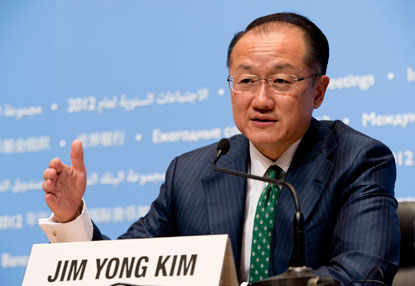Jim-Yong-Kim---FLICKR.jpg

Photo: Flickr
Speaking at the London School of Economics this week, the bank’s president Jim Yong Kim said that, as connectivity increasingly allows people to see how others everywhere live, aspirations are rising.
These high aspirations can either be positive and dynamic, or, in different circumstances, breed resentment and anger, he continued.
“I worry, and studies suggest, that if there’s no opportunity to achieve those aspirations, frustration may very well lead to fragility, conflict, violence, extremism and eventually migration,” said Kim.
He stressed that delivering those opportunities depends on moving from billions in aid to trillions in investment of all kinds.
“To get to trillions, we need to change the way we do our work,” he stated. “Now, to be honest, we haven’t changed the way we do our work enough – not yet.
“To succeed with the immense task ahead of us, we have to fundamentally change our approach to development finance.”
This will include using public and concessional finance in “innovative ways”, which mitigate risk and support private sector investment.
This will in the long run leave more space for scarce public funding to be spent in areas where objectives cannot be met by commercial finance, he explained.
But bringing in the private sector wherever possible will be key, he emphasised. This means that the international development finance system must always be looking to help governments negotiate good deals with the private sector when a project is commercially viable, and help build viable markets for companies to invest in on their own.
“Our goal isn’t just to de-risk projects,” he noted. “It is to de-risk entire countries.”
However, he added, the private sector should only be brought in if “it’s in the best interests of everyone, especially those currently excluded from the benefits of development”.
“Let me be clear – this isn’t like the bad old days of privatisation,” he said. “We’re not talking about reviving an approach where the answer to poorly run public services, or unprofitable state-owned enterprises, was often an over-simplified attempt at privatisation.”
He called for a different approach that focuses on whether the regulatory context provides the right incentives for efficient management, whether commercial principles are being applied consistently and whether subsidies are transparent, focused on the poor and, ideally, funded without interfering with commercial viability.
Mainly, he said, the development community should be looking to deliver “win-win outcomes”, where investors get a reasonable return, and developing countries maximise sustainable investments.
He said this will require a “fundamental shift in [the development community’s] conception of who we are”, chiding finance institutions for competing to fund projects, especially via the private sector.
“For too long, our first thought was how can we get the loan or grant out the door? But that’s often not what’s best for poor people and poor countries, and it’s not what’s best for the world.”
Speaking specifically with regards to the bank, he said: “Right now, we see ourselves as a lender. We see ourselves as an investor.
“Instead, we have to think of ourselves as strategic advisors and honest brokers who link capital looking for greater returns to countries looking to achieve their highest aspirations.
“We need to have a different and difficult conversation about how we approach development finance. This is an urgent task. The clock is ticking.”













